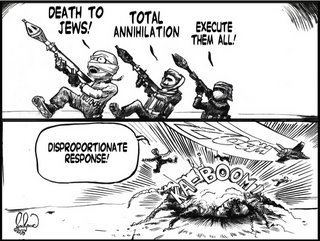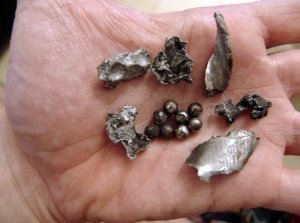The sympathetic eye
Charles Moore reflects on the words chosen by a Parliamentarian criticising Israel for its actions in Lebanon, which were described as "a war crime grimly reminiscent of the Nazi atrocity on the Jewish quarter in Warsaw". Standard fare when spoken by hysterics on the Left; a little less to be expected from the longest-serving Tory MP, Sir Peter Tapsell. Moore wonders what possesses otherwise reasonable people when they talk about the Middle East, or more precisely, about Israel. European discourse on the subject seems to have been overwhelmed by something else - a narrative, told most powerfully by the way television pictures are selected, that makes Israel out as a senseless, imperialist, mass-murdering, racist bully.
Quite apart from the good points that he makes, there is one element that I would like to enlarge upon. It has nothing to do with ideology or partisanship; it could almost be termed 'technical', though its implications for the use and maintenance of Western power are immense.
The most powerful medium for delivering news is television, and television news is most powerful when it is able to evoke sympathy/empathy. A report has impact when it engages the viewer's imagination and it generally does so through pity. Pity at the sight of individual suffering, the what-does-it-feel-like of political and catastrophic events. Show an image of a child's body in adult arms, and you're there. That is what you will remember; that is what will colour, and even dominate, your view of the events. It is direct, emotional and indeniable.
It is perfectly natural that television should tend towards this type of coverage simply because it does what almost any television programme, or virtually any form of communication, seeks to do: it has an impact. The approach is not limited to the small action-filled screen. The teaching of history now is based on the necessity of understanding the viewpoint of the powerless, imaginatively reconstituting the silent voices of the 'disappeared', the bit-actors of great events. One of the aims of traditional studies in literature was the development and refinement of the sympathetic imagination with relation to the lives of those we will never know. This essential social and emotional skill is rightly prized. It is also ruthlessly exploited.
A view dominated by sympathy is extremely limited. Precisely because it has such a hold over us, it is a great impediment to understanding. It distorts perspective; it does not allow the individual events to take their place in a longer and broader view. It reverses the visual logic in Egyptian murals by making the foot-soldier thrice the size of all the other figures in the landscape thus rendering the scene incomprehensible. He had to fight, and he died - that's all, apart from the pity, we will get. It also leads to passivity because it is a litany of helplessness and a rollcall of victims. Since we cannot, through this eyeglass, even glimpse the elements that led to the decisions distantly made; since the potentials averted by those decisions are invisible and weightless, how can that suffering appear if not senseless and cruel?
Attitudes feed by the sympathetic eye of the camera are therefore limited and debilitated. They are politically dangerous because they do not inform effective action. Quite the contrary, they engender fear of action because the immediate consequences of that action are too vividly imagined. It is like the fear of learner drivers who at every turn must look through a blood-coloured veil of their own creation at all the distruction they might create. They lack the perspective to accurately calculate probabilities. They drive reacting to phantoms and are therefore bad drivers incapable of using responsibly the power they possess. If they cannot marginalise their imagination and momentarily treat other road-users as objects of velocity and mass constrained by certain rules, they will never drive well.
Those in power cannot, must not think like this. Their sympathies must be more general and more abstract; their calculation colder and more precise. Otherwise they will be paralysed and, insofar as they are powerful, all the more dangerous. (Cont)
Tagged: The West, Television news, Exercise of power






